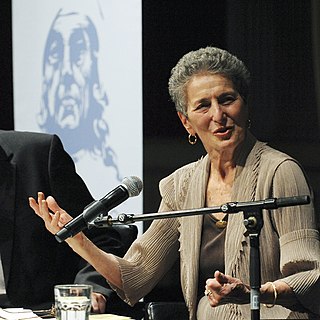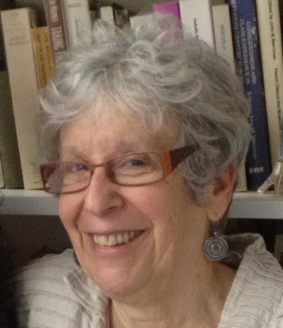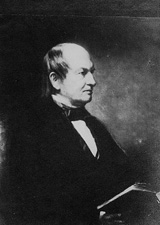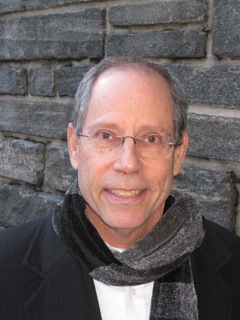Related Research Articles

Natalie Zemon Davis, was an American-Canadian historian of the early modern period. She was the Henry Charles Lea Professor of History at Princeton University. Her work originally focused on France, but it later broadened to include other parts of Europe, North America, and the Caribbean. For example, her book, Trickster Travels (2006), views Italy, Spain, Morocco and other parts of North Africa and West Africa through the lens of Leo Africanus's pioneering geography. Davis' books have all been translated into other languages: twenty-two for The Return of Martin Guerre. She was the second female president of the American Historical Association.
William Morgan Fowler Jr. is a professor of history at Northeastern University, Boston and an author. He served as Director of the Massachusetts Historical Society from 1998 through 2005.

Joan Wallach Scott is an American historian of France with contributions in gender history. She is a professor emerita in the School of Social Science in the Institute for Advanced Study in Princeton, New Jersey. Scott is known for her work in feminist history and gender theory, engaging post-structural theory on these topics. Geographically, her work focuses primarily on France, and thematically she deals with how power works, the relation between language and experience, and the role and practice of historians. Her work grapples with theory's application to historical and current events, focusing on how terms are defined and how positions and identities are articulated.
Barrie Thorne is a professor of sociology and of Gender and Women's Studies at the University of California, Berkeley.
Herrick Chapman is a prominent historian of France. Since 1992 he has been employed at New York University, where he is Professor of History in the Department of History and Institute of French Studies. Professor Chapman was educated at the University of California, Berkeley and Princeton University.

Norman Morrison Isham (1864–1943) was a prominent architectural historian, author, and professor at Brown University and Rhode Island School of Design (RISD). He was an ardent preservationist and a pioneer in the study of early American architecture.

Albert Collins Greene was an American lawyer and politician from Rhode Island. He served as a United States senator and Attorney General of Rhode Island.
William James Bouwsma was an American scholar and historian of the European Renaissance. He was Sather Professor of History Emeritus at the University of California, Berkeley and president of the American Historical Association (AHA) in 1978.
Jorge Cañizares-Esguerra is a faculty member in the history department at the University of Texas at Austin, where he holds the Alice Drysdale Sheffield Professorship in History. He is most notable for his work in Atlantic history, the history of science in the early modern Spanish empire, and the colonizing ideologies of the Iberian and British empires.
Edith Roelker Curtis (1893–1977) was a New England writer, historian, and diarist.

Philip Benedict is an American historian of the Protestant Reformation in Europe, currently holding the title of Professor Emeritus at the University of Geneva’s Institute for Reformation History.
Estelle Freedman is an American historian. She is the Edgar E. Robinson Professor in U.S. History at Stanford University She received her Bachelor of Arts degree from Barnard College in 1969 and her Master of Arts (1972) and PhD (1976) in history from Columbia University. She has taught at Stanford University since 1976 and is a co-founder of the Program in Feminist Studies. Her research has explored the history of women and social reform, including feminism and women's prison reform, as well as the history of sexuality, including the history of sexual violence.

Antoinette Forrester Downing was an American architectural historian and preservationist who wrote the standard reference work on historical houses in Rhode Island. She is credited with spearheading a movement that saved many of Providence's historic buildings from demolition in the mid 20th century and for her leadership was inducted into the Rhode Island Heritage Hall of Fame in 1978.
Ruth Schachter Morgenthau, was a professor of international politics at Brandeis University and an advisor to President Jimmy Carter on rural development in poor countries.
Bruce J. Schulman is an American historian, currently the William E. Huntington Professor at Boston University. From 2022-23, Schulman served as the Harmsworth Professor of American History at The Queen's College, Oxford.
Brian Balogh is an American historian, and professor at the University of Virginia. Balogh is the director of the National Fellowship Program hosted by the Jefferson Scholars Foundation. He also co-hosted the radio program, "Backstory with the American History Guys". In 2015, he received a Nancy Lyman Roelker Mentorship Award.
Nancy B. Grimm is an American ecosystem ecologist and professor at Arizona State University. Grimm's substantial contributions to the understanding of urban and arid ecosystem biogeochemistry are recognized in her numerous awards. Grimm is an elected Fellow of the American Geophysical Union, Ecological Society of America, and the American Association for the Advancement of Science.
Pamela Estephania Harris is a Mexican-American mathematician, educator and advocate for immigrants. She is currently an associate professor at the University of Wisconsin-Milwaukee in Milwaukee, Wisconsin, was formerly an associate professor at Williams College in Williamstown, Massachusetts and is co-founder of the online platform Lathisms. She is also an editor of the e-mentoring blog of the American Mathematical Society (AMS).

Nancy Jane Tarbell is the C.C. Wang Professor of Radiation Oncology at Harvard Medical School and Massachusetts General Hospital. Previously, she was the Dean for Academic and Clinical Affairs at Harvard Medical School (2008–2019).
Gary R. Kates is an American historian who specializes in the European Enlightenment and the French Revolution. He is the H. Russell Smith Foundation Professor of History at Pomona College in Claremont, California. He previously served as the dean of the college from 2001 to 2009.
References
- 1 2 3 4 5 6 "Nancy L. Roelker, 78, Professor at Boston U. (Published 1993)". 1993-12-02. Retrieved 2023-08-16.
- ↑ "Nancy Lyman Roelker Mentorship Award". American Historical Association. Retrieved 18 August 2023.
- ↑ "William Greene Roelker (1886 – 1953)". Rhode Island Historical Society. Retrieved 17 August 2023.
- ↑ "Nancy Lyman Roelker papers (Ms.2012.006)". Rhode Island Archival and Manuscript Collections Online. Retrieved 16 August 2023.
- ↑ "Nancy Roelker Papers". Brown University Library Bibliofile page. Retrieved 16 August 2023.
- ↑ "Guide to the Nancy Lyman Roelker Papers at Brown University". Nancy Lyman Roelker papers. Retrieved 15 August 2023.
- ↑ "Academy page for Nancy Lyman Roelker". American Academy of Arts and Sciences. Retrieved 16 August 2023.
- ↑ "Nancy Lyman Roelker". Guggenheim Fellowships. Retrieved 16 August 2023.
- ↑ "Nancy Lyman Roelker papers (Ms.2012.006)". Rhode Island Archival and Manuscript Collections Online. Retrieved 16 August 2023.
- ↑ "Nancy Lyman Roelker papers (Ms.2012.006)". Rhode Island Archival and Manuscript Collections Online. Retrieved 16 August 2023.
- ↑ "Nancy Lyman Roelker Mentorship Award Recipients". American Historical Association. Retrieved 15 August 2023.
- ↑ "Sixteenth Century Society & Conference". sixteenthcentury.org. 2014. Retrieved 15 August 2023.